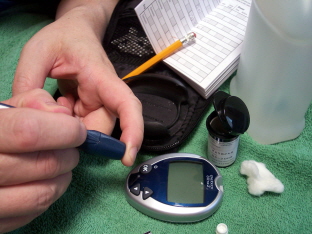 Diabetes is a complex metabolic disorder that causes damage to the body systems and organs through an increase in blood sugar levels well above normal. This increase in blood sugar can be the result of two different types of diabetes.
Diabetes is a complex metabolic disorder that causes damage to the body systems and organs through an increase in blood sugar levels well above normal. This increase in blood sugar can be the result of two different types of diabetes.
In type-1 diabetes the pancreas shuts down and no longer produces insulin. While in type-2 diabetes insulin continues to be produced but the body becomes resistant to the hormone and can no longer use it.
Changes to your health happens over years and can sometimes be attributed to the aging process. Unfortunately, kidney damage, heart damage and stroke happen at a time when an individual is already facing a decline in eyesight, memory, hearing and energy levels that accompany the process of aging . It is compounded if you have not made the best lifestyle choices.
Diabetes will also have an effect on the eyesight, heart disease, kidney disease and peripheral vascular disease. The effect of diabetes ends with devastation that leaves an individual debilitated at the end of their life.
These changes can be delayed when you make several lifestyle changes and choices that improve your health. But these changes potentially require major differences in the way that you live, eat and enjoy a social life. In either case the person who suffers from diabetes will go through a grieving process because of both the lifestyle choices that are forced upon them and the potential future they are now facing.
The symptoms of diabetes are sometimes so subtle that people will ignore them and put off diagnosis for weeks and even months. Researchers are now finding that the earlier a diagnosis is made, the longer medical repercussions of diabetes can be delayed. These symptoms are caused by high blood glucose level, or blood sugar level, that affects the way in which the kidney filters urine. (1,2)
The extra glucose that is in the blood will cause significant and cumulative damage to the eyes and retina; the long term effects of which are blindness. Damage is also done to the heart muscle which can potentiate the effects of heart disease, stroke and increase the risk of heart attacks.
The damage done to the vascular system in the heart also affects the vascular system in the hands and feet, more prominently the feet. This is called the peripheral vascular system that feeds your feet and hands with oxygen and nutrition. The increased blood sugar will cause the vascular system to work poorly and allows fluid to build up in the extremities. This causes swelling in the feet and can lead to open sores, gangrene and amputation. All of this is the result of the increase fluid builds up in the cellular structures of the feet which increases the risk of infection and decreases the ability of the body to repair itself. (3)
The increased amount of blood glucose also increases the work of the kidneys which takes an incredible toll over the years. The kidneys accurately attempt to filter the extra glucose out of the bloodstream. In order to do this more water must be extracted from the blood which leads to dehydration and thirst in the individual. It also leads to an increased amount of urination. This increased workload will lead to kidney failure if the diabetes is not well controlled. The added strained to the vascular system in the kidneys will also contribute to kidney failure. (4)
The long-term effect of diabetes has the potential to be devastating. Individuals face the future with potential loss of legs to amputation, kidney dialysis because of a failed kidney or stroke or heart attack from vascular damage. However, with care, lifestyle changes and strictly following the recommendations of the endocrinologist, most individuals are able to significantly delay and potentially alleviate these effects completely.
References
(1) PennState Hershey Milton S. Hershey Medical Center: Diabetes Type-1
http://pennstatehershey.adam.com/content.aspx?productId=10&pid=10&gid=000009
(2) American Diabetes Association: Tight Diabetes Control
(3) Kids Health: Long-Term Complications of Diabetes
http://kidshealth.org/teen/diabetes_center/basics/complications.html
(4) Medline Plus: Long-term Complications of diabetes
http://www.nlm.nih.gov/medlineplus/ency/patientinstructions/000327.htm

Recent Comments